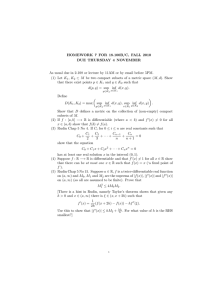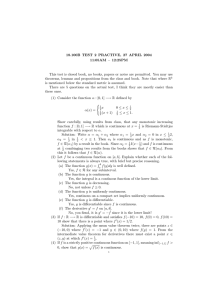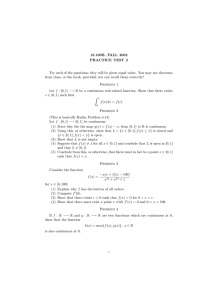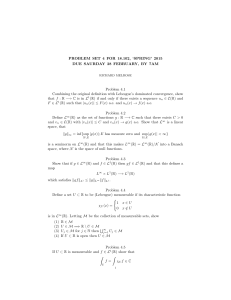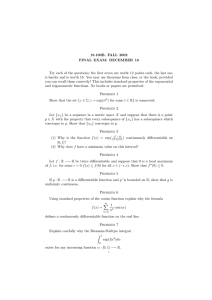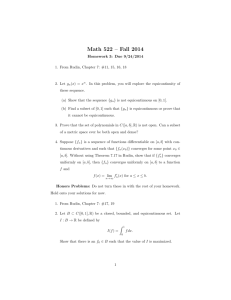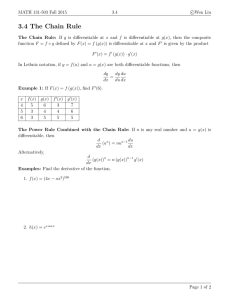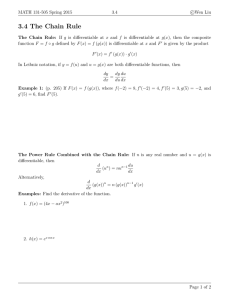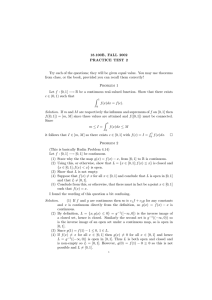MATH 321:201: Real Variables II (Term 2, 2010)
advertisement
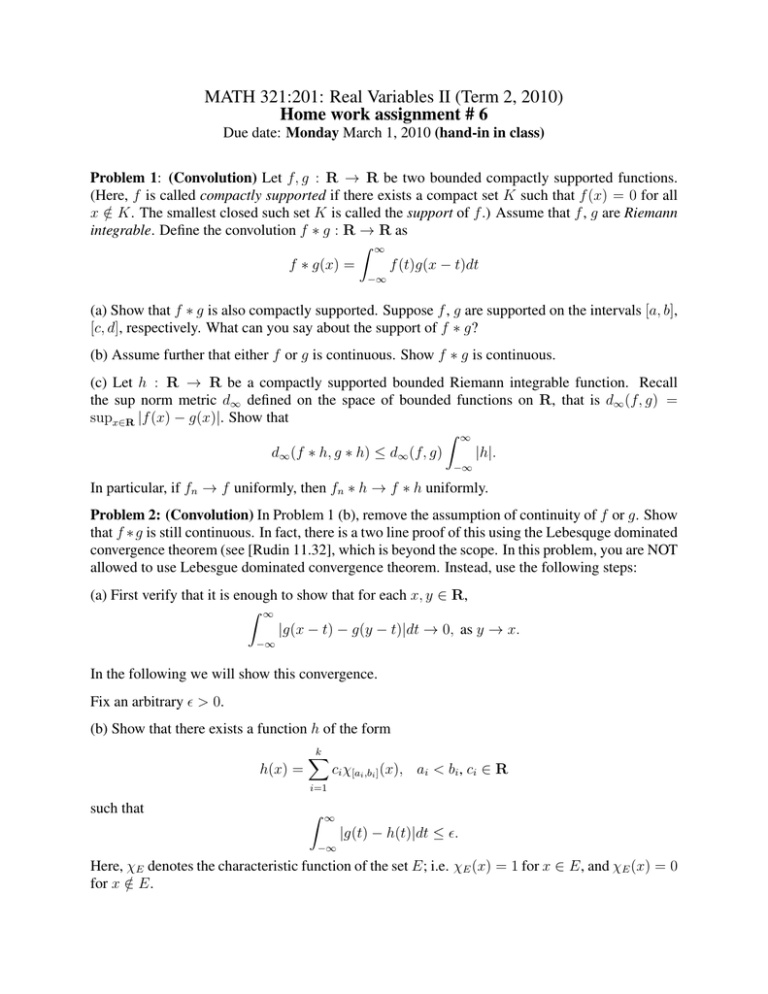
MATH 321:201: Real Variables II (Term 2, 2010) Home work assignment # 6 Due date: Monday March 1, 2010 (hand-in in class) Problem 1: (Convolution) Let f, g : R → R be two bounded compactly supported functions. (Here, f is called compactly supported if there exists a compact set K such that f (x) = 0 for all x∈ / K. The smallest closed such set K is called the support of f .) Assume that f , g are Riemann integrable. Define the convolution f ∗ g : R → R as Z ∞ f (t)g(x − t)dt f ∗ g(x) = −∞ (a) Show that f ∗ g is also compactly supported. Suppose f , g are supported on the intervals [a, b], [c, d], respectively. What can you say about the support of f ∗ g? (b) Assume further that either f or g is continuous. Show f ∗ g is continuous. (c) Let h : R → R be a compactly supported bounded Riemann integrable function. Recall the sup norm metric d∞ defined on the space of bounded functions on R, that is d∞ (f, g) = supx∈R |f (x) − g(x)|. Show that Z ∞ |h|. d∞ (f ∗ h, g ∗ h) ≤ d∞ (f, g) −∞ In particular, if fn → f uniformly, then fn ∗ h → f ∗ h uniformly. Problem 2: (Convolution) In Problem 1 (b), remove the assumption of continuity of f or g. Show that f ∗g is still continuous. In fact, there is a two line proof of this using the Lebesquge dominated convergence theorem (see [Rudin 11.32], which is beyond the scope. In this problem, you are NOT allowed to use Lebesgue dominated convergence theorem. Instead, use the following steps: (a) First verify that it is enough to show that for each x, y ∈ R, Z ∞ |g(x − t) − g(y − t)|dt → 0, as y → x. −∞ In the following we will show this convergence. Fix an arbitrary > 0. (b) Show that there exists a function h of the form h(x) = k X ci χ[ai ,bi ] (x), ai < bi , ci ∈ R i=1 such that Z ∞ |g(t) − h(t)|dt ≤ . −∞ Here, χE denotes the characteristic function of the set E; i.e. χE (x) = 1 for x ∈ E, and χE (x) = 0 for x ∈ / E. (c) Show that for each closed interval [a, b] Z ∞ |χ[a,b] (x − t) − χ[a,b] (y − t)|dt → 0, as y → x. −∞ (d) Show that we can choose δ > 0 such that for any |x − y| ≤ δ, Z ∞ |g(x − t) − g(y − t)|dt ≤ . −∞ Problem 3: Do [Rudin, Ch7. Exercise # 21]. Problem 4: Prove the following: (a) If f is a continuous real-valued function defined on the set [a, b] × [c, d] and > 0, then there exists a real-valued polynomial function p in two variables such that |f (x, y) − p(x, y)| < for all x in [a, b] and y in [c, d]. (b) If X and Y are two compact metric spaces and f : X × Y → R is a continuous function, then for every > 0 there exist n > 0 and real-valued continuous functions f1 , f2 , ..., fn on X and real-valued continuous functions g1 , g2 , ..., gn on Y such that n X sup f (x, y) − fi (x)gi (y) < . (x,y)∈X×Y i=1 The following are suggested exercises. Please DO NOT hand-in, but, it is important for you to do these suggested exercises! Problem: Do Rudin, Ch. 7, Exercises # 22. Problem*: (Convolution) This exercise is beyond the scope of this course. In Problem 1, further assume that f is differentiable. (a) Use Lebesgue Dominated Convergence Theorem (see [Rudin, 11.32]) to show very easily that f ∗ g is differentiable and its derivative satisfies (f ∗ g)0 = f 0 ∗ g. (Especially, if f is smooth, i.e. differentiable at any order, then f ∗ g is also smooth.) (b)* Show this WITHOUT using Lebesgue Dominated Convergence Thereom (LDCT). Problem*: (Density of the set of nowhere differentiable continuous functions) Let N D denote the set of nowhere differentiable continuous functions on the unit interval [0, 1]. That is, for every function f ∈ N D, f is NOT differentiable at any point in [0, 1]. Is N D a dense subset in C([0, 1], R)? (Here, C([0, 1], R) denotes the space of real-valued continuous functions on [0, 1] equipped with the sup norm metric d∞ .) Justify your answer! 2
